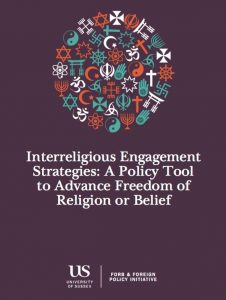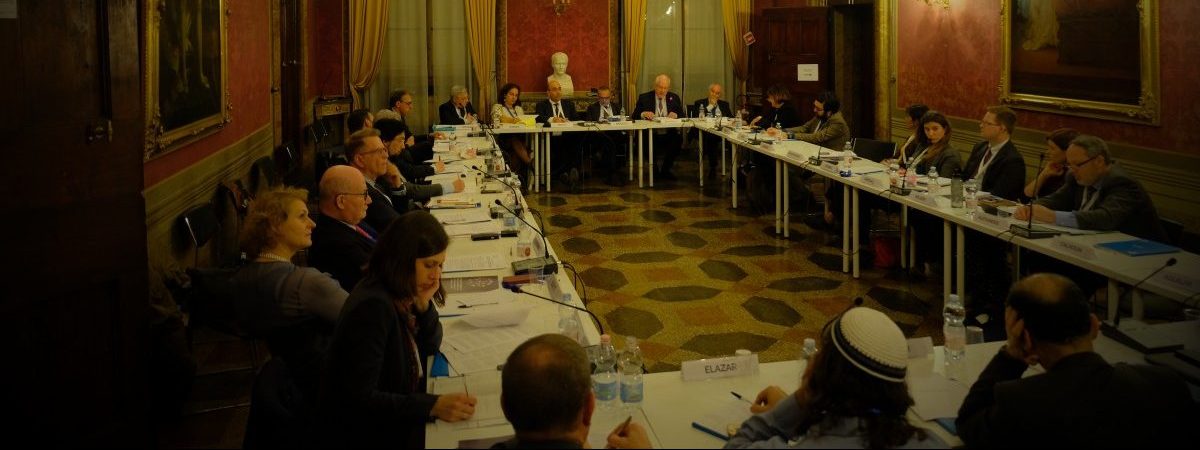Fabio Petito has been at the center of policy and scholarly discussions around freedom of religion or belief (FoRB), inter-religious dialogue, and sustainable development. He is a senior lecturer in international relations at the University of Sussex, director of the university’s FoRB & Foreign Policy Initiative, and head of the Programme on ‘Religions and International Relations’ run by the Italian Ministry of Foreign Affairs and Italian Institute for International Political Studies (ISPI). A recent report released by the University of Sussex highlights many of the key findings and policy recommendations from Petito and his collaborators.
Earlier this year several members of the TPNRD participated in a workshop in Bologna, on the sidelines of the European Academy of Religion’s annual conference, sponsored by the Religions and International Relations programme (workshop report here).
In this interview with Religion & Diplomacy Petito discusses a range of issues surrounding FoRB, inter-religious collaboration, and development—and how the three issues are inter-related.
Religion & Diplomacy: Interreligious dialogue, freedom of religion or belief (FoRB), and sustainable development are typically seen as very distinct issues, with separate NGOs, donor bases, and constituencies. In a nutshell, what is the connection between the three causes?

Fabio Petito. photo credit: University of Sussex
Fabio Petito: To understand our call for a more strategic linkage among these three issues, one must first look at our analysis of the global crisis of freedom of religion or belief. Violations of FoRB can be broadly categorized into two different, though inter-linked, dimensions: on one hand there is direct denial of and interference with this right by States. And on the other hand there is the failure of States to sufficiently protect this right. Our report argues that today it is crucial to focus on the latter because of the growth of a worrying trend of social hostility between communal groups based on religion or belief throughout the world.
This form of religious discrimination is thriving in the context of collective identity conflicts and concerns about social cohesion, often exacerbated by other social conditions such as economic insecurity. We see a great deal of ‘othering’, that is, the construction of self-identity through opposition to a dangerous or threatening Other, as is evident in the context of new forms of religious nationalism and populist politics. The report, therefore, highlights negative stereotyping, stigmatization, hate speech, intolerance, and communal violence based on religion or belief. These trends are characterized by the growing role of societal actors as FoRB violators. This is a key challenge that the international community must face.
This is why today the protection of FoRB is, in our reading, inseparable from the promotion of peaceful and inclusive societies—one of the central tasks of the Sustainable Development Goal agenda, in particular SDG 16. Therefore, we call on governments and international organisations to take the potential of interreligious dialogue and collaboration seriously and to conceive of these religious-led practices as crucial policy tools to promote FoRB and combat intolerance and discrimination based on religion or belief. This is what we call interreligious engagement strategies. Furthermore, it is interesting to note that some of these transversal themes and connections have also emerged in the recently released policy document on Freedom of Religion or Belief and Security: Policy Guidance published by the OSCE Office for Democratic Institutions and Human Rights (ODIHR) under the leadership of Kishan Manocha.
R&D: If FoRB and development go hand in hand, what are we to make of outliers, such as China or many nations in sub-Saharan Africa, that have one but not the other?
Petito: Our report doesn’t really engage with the arguments made by other experts, like Brian Grim, on the positive correlation between the promotion of FoRB and economic development. For us, the dimension of sustainable development which is important to our FoRB focus is the human-centred one, that is, the recognition that there cannot be an integral sustainable development without the flourishing of inclusive and peaceful societies which respect cultural and religious diversity.
R&D: The report challenges the idea that religious literacy is simply knowing the core tenets of major religions. What kind of religious literacy is needed, especially among policymakers?
Petito: The idea of interreligious engagement is predicated on: 1) a careful understanding of the diverse forms of interreligious dialogue and collaborations (ranging from theological exchanges to day-to-day socializing and common social action by different religious, spiritual, and philosophical groups and individuals), and their potential social impact; and 2) the appropriate form of engagement and partnership that states and international organisations can develop with interreligious actors, groups, coalitions, platforms, and activities to advance human rights, combat intolerance and discrimination based on religion or belief, and foster the development of peaceful and inclusive societies.
This complex process requires an improved religious literacy in government. Policy makers should be able to understand the religious perspectives and constraints of religious actors in specific national-cultural contexts for interreligious engagement strategies to be successful. While this does require some degree of understanding of the religious/theological doctrines, what is more important to this enterprise is an understanding of the socio-cultural dimension of religion and its complex embeddedness in the social fabrics of societies, as well as the historical development of their specific forms of state-religious arrangements. In particular, a good mapping of the diversity and varieties of religious actors and practices in a specific national context appear as a good starting point for an improved religious literacy among policymakers. As for interreligious engagement strategies, all forms of interreligious dialogue and collaboration can be impactful in advancing FoRB, provided that the policy design and implementation have carefully joined up the local with the global level and the secular with religious dimension. This requires a religious literacy that is not a static understanding of religions, but a dynamic local and global understanding of this vital vector for societies, communities, and individuals.
R&D: Some expressions of interfaith dialogue are criticized for emphasizing the essential unity or sameness of all religions. This report calls that emphasis “counterproductive.” Why?

Photo credit: University of Sussex
Petito: Our report shows that the forms of religious dialogue and collaborations which carry most potential in terms of combatting intolerance and discrimination based on religion or belief are those that recognise and respect the differences of the participants and strive to involve religious actors beyond “the usual suspects.” The radical (we could say prophetic, using Abrahamic language) transformative social potential of interreligious dialogue and collaboration lies well-beyond the platitude of a lowest common denominator approach. As we live an era of new challenges to FoRB, we need to look at the transformative potential of an interreligious process in a much more radical and courageous way than the simple reference to a superficial sameness of religious traditions.
Here it is worthwhile to note that there is a scepticism in certain circles on the very usefulness of interreligious dialogue when dealing with violations of FoRB. This is, to some extent understandable, as in recent years we have seen a proliferation of high-level interreligious dialogue initiatives whose real impact on the ground (beyond their declaratory result) has been minimal or arguably sometimes even counter-productive. For instance, governments such as Saudi Arabia have used interfaith events as a sort of external PR exercise to actually hide the sad state of affairs of FoRB inside their countries.
This position, however, is not only reproducing some of the well-rehearsed secular critiques (religious leadership is elitist, exclusionary, uncritical, unaccountable, etc…) which we can only hope more religious literacy could contribute over time to tame, but more importantly it is overlooking the remarkable, well-evidenced social and political effect in the last few decades of interreligious dialogue and collaboration in peace-building. It also does not deal with what our report identifies as the most promising trends in interreligious actions: going from global to local and being driven by youth, women and not the usual suspects. The three case studies presented in our report show these trends, and we could add the impressive innovative interreligious work done by Christian organisations like the Community of Sant’Egidio, non-confessional and secular groups like Coexister, and Islamic-inspired groups like Hizmet (also known as Gulen movement).
R&D: The workshop in Bologna was the 10th edition of the International Workshop on Religions and International Relations, convened by ISPI and the Italian Ministry of Foreign Affairs. How did this workshop series get started and what has been its fruit? Does it provide a model of scholar-practitioner collaboration on religious issues that other nations can emulate?
Petito: The Italian Initiative on Religion and International Relations was launched in 2009 by the then head of the Policy Planning Unit of the Italian MFA, Pasquale Ferrara, in collaboration with Italian Institute for International Political Studies (ISPI). The last few years, the initiative has seen an important turn into a more policy and action-oriented programme. This has been institutionally based at ISPI, and has been co-constructed through a constant dialogue with leadership of the Policy Planning Unit under the leadership of Armando Barucco.
This interesting model has produced a number of analyses and insights on different policy issues (from migration to FoRB and Sustainable Development), which have been tested through yearly policy dialogues and have then been translated into valuable policy recommendations. As a consequence of these activities, the religious factor has progressively been embedded in the internal discussions of the Italian MFA and the opportunity to more intensively engage with religious actors is meeting increasing consensus among Italian foreign policy practitioners.

Scholars, practitioners, and government officials at the March 2019 meeting in Bologna. photo credit: ISPI.
Reflecting on our experience, we have claimed that our efforts to foster scholar-practitioner collaboration over the years have developed in nuce what could be called an Italian model of religious engagement in foreign policy, which emphasizes: 1) the construction of knowledge base for foreign policy generated through encounter and dialogue with religious communities and religious non-state actors; and 2) perhaps more controversially, the idea that Italy, as the country which hosts the Holy See, has a unique geo-religious position as a hub of a global network of religious connections. Italy could develop a unique model of religious engagement by leveraging the vast network of Rome-based religious non-state actors as a forum of consultation and policy advice.
I say this is controversial because the Catholic-connection has raised eyebrows in some circles, which have failed to understand that what was proposed was not a sort of ‘Catholic power’ renewal in Italian foreign policy. What we argued for is the development of a strategic and situated post-secular foreign policy capable of articulating new innovative partnerships and solutions to common challenges by drawing on the uniquehub of a transnational network of religions connections linking Rome to other religious traditions, communities, and organizations. This would be facilitated by a sort of mediation of the Italian or Roman-based Catholic world that is, via the links that the Holy See, local and national churches, and the many Catholic organizations or non-state actors headquartered in Rome have worldwide with religious communities and leaders abroad.
R&D: It seems that much of the energy and expertise around issues of religion in international affairs comes from Italy—or Italians abroad. Why is that?
Petito: This is an interesting observation. In addition to what I said above about Italy as a hub of global religious connections, Italians living as academic émigré abroad have often contributed to the last 20 years of emerging discussion and sub-field of research religions in IR. They have acted as sort of ‘passeurs’ between the national and the global international relations and foreign policy community. In some ways, Italy’s history and fabric of society made it self-evident to Italians that religion matters in politics and, more importantly, made them open to a different and more reflexive understanding of the role of religions in international affairs. In a nutshell, for Italians the political ambivalence of religion is obvious: religion did not need to be thought of only as the problem in international affairs but could also be seen as a potential solution to problems.
R&D: The report notes the current negative trends for FoRB around the world. Are you ultimately optimistic about the prospects for FoRB?
Petito: I am worried. I think we have entered a new epoch-making transformation in the ideological-normative structure of the international society which is increasingly marked by a new form of ideological politics where civilizational, religious, and culturalist references play a more important role than before. This can amplify the growth of the already worrying trend of social hostility between communal groups based on religion of belief throughout the world as well as the growing role of societal actors as FoRB violators in the context of indirect failure of the state to protect this right or instability of fragile-states and regional conflicts.
This is why we need a new and reinvigorated season of interreligious dialogue, collaboration, and activism strategically facilitated and supported by carefully designed post-secular partnerships with governments and international organisations. These interreligious engagement strategies seem to me today to be potentially more impactful in advancing FoRB and to carry the promise of a new politics of hope—something we all know we need more than anything in our societies in the Global North and South, East and West.